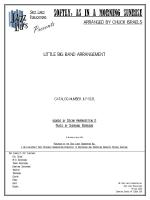SOFTLY, AS IN A MORNING SUNRISE
Arranged by Chuck Israels

Cat #: JLP-5131
$50.00This item usually ships within 1 business day.
Questions?
Please call +1-518-587-1102 or email us.
Edition: Jazz Nonet Arrangement
Description: Swing - Medium
Publisher: Jazz Lines Publications
From Chuck
"This Sigmund Romberg tune, Softly, As in a Morning Sunrise, is a safe one to call at most any jam session. Jazz musicians know and like it. (Sonny Clark’s piano trio recording is a fine example of why it stands as satisfying template for creative jazz improvisation.) I wrote this arrangement as a paraphrase of the tune (and called it Warming Trend) before it came into the public domain. When Rob Duboff suggested arranging “Softly…” as a well-known, now public domain, song for which there might be a welcoming audience, I’d already done most of the work. I like the paraphrased melody I’d written for Warming Trend and didn’t want to let it go. Maybe more people will be likely to hear and appreciate it, if they hear and understand it in relation to a song they already know and like.
Rather than starting this arrangement with the Romberg’s melody, I used what I’d already written and let it evolve at the end into Romberg’s song. Apart from the paraphrased, new melody, there’s some personal harmonic treatment. In the last A section of each chorus of the AABA form, there’s deceptive harmony reminiscent of something my teacher, Hall Overton (the arranger of Monk’s music for his Town Hall concerts) showed me about how to use major seventh harmony as a contrast to the ever present dominant tonic relationships—the way Bud Powell and other bebop pianists would use a cycle of major seventh chords in turnarounds between a tune’s formal phrases. That harmony provides moments of expanded romanticism in this arrangement.
Other than that, the diminished seventh chord that appears in the third and fourth measures of the B section—a harmonic moment for which every improvising jazz musician is prepared, adds something I learned from playing with Bill Evans. Jazz musicians with sophisticated understanding of the melodic opportunities afforded by diminished seventh chord harmony, include non-chord tones a major second above each of the tones in the chord in their improvisations. When playing with Bill, I noticed that he played diminished chords that sounded richer and more colorful than what I’d been used to hearing, and I later figured out that it was because he habitually included one or more of those non-chord tones in his accompanying chords. The measures that have that diminished seventh chord harmony in this arrangement also include some of those non-chord harmonic extensions. It gives those passages some fire."
Alto Saxophone
Tenor Saxophone
Baritone Saxophone
Trumpet
Trombone
Guitar
Piano
Bass
Drums
Trombone: Gb4









